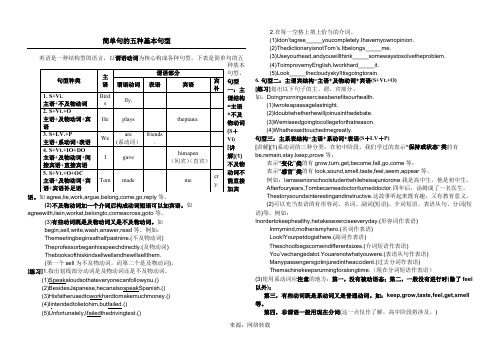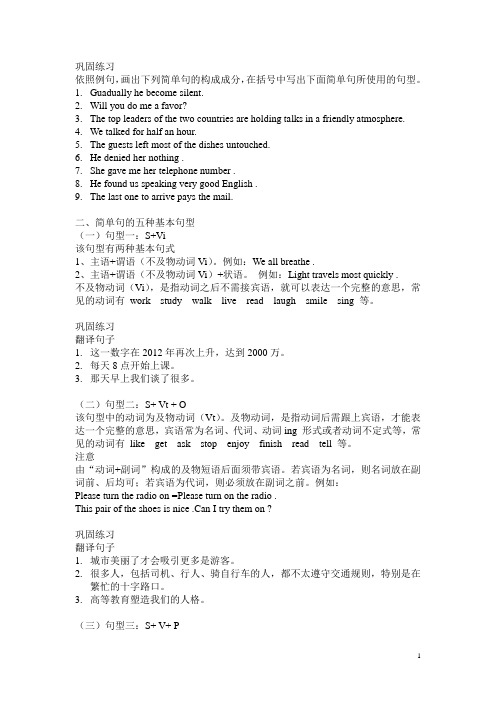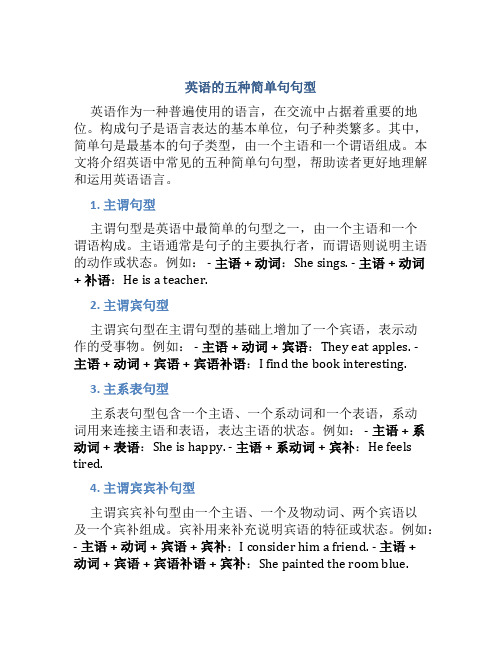简单句的种类
简单句5种基本句型

简单句的五种基本句型英语是一种结构型的语言,以谓语动词为核心构成各种句型。
下表是简单句的五[(1)Speakaloudsothateveryonecanfollowyou.() (2)BesidesJapanese,hecanalsospeakSpanish.() (3)Hisfatherusedtoworkhardtomakemuchmoney.() (4)Iintendedtolietohim,butfailed.()(5)Unfortunately,Ifailedthedrivingtest.()2.在每一空格上填上恰当的介词。
(1)Idon’tagree_____youcompletely.Ihavemyownopinion. (2)ThedictionaryisnotTom’s.Itbelongs _____me.(3)Useyourhead,andyouwillthink_____somewaystosolvetheproblem. +宾语(S+Vt.+O)(S +LV +P)“保持或状态”类的有等;等。
我是高中生,他是初中生。
四年后,汤姆成了一名医生。
这故事听起来既有趣,又有教育意义。
(短语)、介词短语、表语从句、分词(短形容词作表语)) )介词短语作表语)表语从句作表语) 过去分词作表语)(现在分词短语作表语)(3)使用系动词应注意的地方:第一,没有被动语态;第二,一般没有进行时(除了feel 以外);第三,有些动词既是系动词又是普通动词。
如:keep,grow,taste,feel,get,smell 等。
第四,非谓语一般用现在分词(这一点仅作了解,高中阶段将涉及。
)例如:Aftertwo-day’streatment,hefeltwellagain.(不用wasfelt) Heremainsanexcellentengineerinthefactory.(不用isremained)比较:We grew sometreesaroundourschoolandthey grow greennow.(grew 是及物动词,意思是________;而grow 是系动词,意思是________) Thepetdog keeps clean.Itis kept byJohnson.(keeps 是________动词,意思是________;而kept 是________动词,意思是________)JustnowI felt thetableandit felt smooth.(摸”;而第二个是________动词,意思是[练习]e)engineer.(2)Putthemeatintherefrigerator(冰箱ce.(7)Pleasekeep__________(安静句型四:主谓双宾结构=主语+及物动词+DO)[讲解](1物为直接宾语。
简单句的六种基本结构

简单句的六种基本结构⏹主语+不及物动词⏹主语+系动词+表语⏹主语+及物动词+宾语⏹主语+及物动词+间接宾语+直接宾语⏹主语+及物动词+宾语+宾语补足语⏹There be +主语句型例如•This knife cuts well.•She seems quite satisfied.•Have you fixed my watch yet?•He owed me 50 yuan.•Xiao Li is helping me mend my bicycle.•There stands an old tower in the east of the town.翻译下列句子⏹高考前同学们常常学习到深夜.⏹我等你等了很久了.⏹玻璃很容易碎.⏹她听了这消息好象很平静.⏹他太累了,刚躺下就睡着了.⏹这家工厂没周生产一千辆小汽车.⏹请你把那本书递给我好吗?⏹我去找个人来帮你修理电脑.⏹我们感到我们的心在激烈的跳动.⏹有很多中国学生在国外留学.Keys⏹Students often work deep into night before the entrance exam.⏹I have been waiting for you for a long time.⏹Glass breaks easily.⏹She appeared quite calm at the news.⏹He was so tired that he fell asleep the moment he went to bed.Keys⏹This factory produces 1 ,000 cars a week.⏹Will you please pass me the book?⏹I’ll get someone to repair the computer.⏹We could feel our hearts beating fast.⏹There are many Chinese students studying abroad.简单句的种类⏹根据使用目的, 句子可分为:⏹陈述句⏹疑问句⏹祁使句⏹感叹句陈述句要特别注意陈述句的否定结构1.否定转移:主句谓语动词是think, expect, believe, suppose, guess, imagine 等表“认为, 猜想” 的动词时, 宾语从句的否定习惯上前移到主句谓语上.eg. I don’t think I know you.She doesn’t believe you are wrong.注意: hope 不在此列.误: I don’t hope it will rain.正: I hope it won’t rain.not…until 的句型非强调句型: I don’t know his name until yesterday.强调句型: It was not until yesterday that I knew his name.倒装句: Not until yesterday did I know his name.有时对状语的否定也移到谓语上.翻译: 我今天觉得不舒服.误: I’m feeling not well t oday.正: I’m not feeling well today.2. 含有否定意义的副词句中含有never, seldom, hardly, scarcely, rarely, barely 时, 应视为否定句.I could hardly see anything.He rarely comes to see me.有些句子在结构上属于肯定式, 但含有否定意义的词⏹None of us has been to Beijing.(否定的主语)⏹I saw nothing in the darkness.(否定的宾语)⏹He begged the teacher not to punish him.(否定的宾补)⏹We could find her nowhere.(否定的状语)3. 部分否定⏹all, both,either, every, everybody, everyday, everywhere, always与not 连用时, 表示部分否定.⏹表示全部否定要用no, neither, none, nobody, nothing, never , nowhere 等词.肯定: All the ants go out for food.⏹部分否定:Not all the ants go out for food.或: All the ants don’t go out for food.⏹全部否定:None of the ants go out for food.或:Not any of the ants go out for food.4. 双重否定without与not, no one, nobody, never, can not等否定词连用,意为‘ 无(没有) …不’ , ‘每…必’.No one can see the film without being moved to tears.人们看了这部电影无不为之感动得流泪. They never meet without quarrelling.他们每次见面必要吵架.其他双重否定结构He is not unfit for his job.他不是不称职.There is noboby here who is not a League member.这里人人都是团员.One can’t learn a f oreign language unless he studies hard.除非用功, 否则学不好外语.He couldn’t help laughing.他禁不住大笑起来.5. 强调肯定意义的否定结构⏹这些结构有cannot …too (over, enough, more)⏹You cannot be too careful.或You cannot be over careful. You cannot be careful enough.⏹We cannot praise him too much.⏹---How are you today? --- Couldn’t be better.⏹I couldn’t agree with you more.6.具有否定意义的肯定结构⏹He is too young to go to school.⏹The problem is far from being settled.⏹It is the last thing I want to do.⏹Such a problem is beyond (above) me.⏹I failed to understand the meaning of the sentence.⏹It has been two months since I smoked.疑问句⏹一般疑问句⏹特殊疑问句⏹选择疑问句⏹反意疑问句特殊的反意疑问句结构1. One can’t be too sure, ____ ______ ?2. Tom seldom goes to the cinema, ____ ___?3. The man is unfit for his job, ____ ______?4. Everyone knows me, _____ _______ ?5. No one was hurt in the accident, _____ ____ ?6. I don’t think he can speak Japanese, _____ ____ ?7. You don’t believe she will come, _____ ______ ?8. What you need is more practice, _____ ______ ?1. One can’t be too sur e, can one/he?2. Tom seldom goes to the cinema, does he ?3. The man is unfit for his job, isn’t he ?4. Everyone knows me, doesn’t he /don’t they ?5. No one was hurt in the accident, were they ?6. I don’t think he can speak Japanese, can he ?7. You do n’t believe she will come, do you ?8. What you need is more practice, isn’t it?9. You needn’t do that when your mother is here, ____ ______ ?10. He is a doctor but his wife is a teacher, _____ ______ ?11. Please open the window, _____ ______ ?12. Le t’s to for a walk, ______ _____ ?13. Let us know if you can go with us, _____ ____ ?14. Let me have another try, ____ ______ ?15. Let me help you, ______ _______ ?16. I wish to go home , _____ ______ ?9. You needn’t do that when your mother is here, need you ?10. He is a doctor but his wife is a teacher, isn’t she ?11. Please open the window, will/would you ?12. Let’s go for a walk, shall we ?13. Let us know if you can go with us, will you ?14. Let me have another try, will you ?15. Let me help you, may I ?16. I wish to go home , may I ?17. Your father must be a doctor,_______ ?18. You must go home right now, ______ ?19. You mustn’t smoke here, _________ ?20. You must have met her yesterday, _______ ?21. You must have seen the film many times, ____________ ?陈述部分用SO 开头, 附加部分采用“同向”疑问.⏹So you are getting married , are you?⏹So you don’t like my cooking, don’t you?⏹口语对话中, 当某人的话表示讥讽或怀疑时, 往往简略重复对方的话后再加上简短问句.①--- Tom told me he saw a bear last night.--- He did, did he?②--- Y ou mustn’t listen to his story.--- Oh, I mustn’t , mustn’t I ?祁使句⏹含主语的祁使句You get out! Everybody stand up!条件祁使句Use your head, and (then) you’ll find a way.→If you use your head, you’ll find a way.Try again, or you’ll fail.→If you don’t try again, you’ll fail.或You’ll fail unless you try again.并列句⏹表示增补关系的并列连词: and, both…and, neither…nor, not…nor, not only …but also, as well as 等.⏹表选择关系的并列连词:or, or else, otherwise, either…or, whether…or.⏹表转折关系: but, while⏹表因果关系: for, so⏹有些副词如besides, moreover, therefore, however, nevertheless, consequently , furthermore等也可以起到并列连词的作用.while 也可表示转折, 但与but 不同的是, 主要强调上下文的一种对比关系.They were surprised that a child should work out the problem while they themselves couldn’t.when 作为并列连词意为“这时”, 位于第一分句后, 此时不能用while或as 代替.I was just about to lie down to rest when I saw a snake in the grass.并列连词不能与从属连词混合使用误: Although he was sick, but he went on working.正: Although he was sick, he went on working.He was sick, but he went on working.He was sick, and yet he went on working.Although he was sick, yet he went on working.在句子中起名词作用的句子叫名词从句(Noun Clauses)。
英语句子种类

英语句子种类一、简单句概念:由一个主语(或并列主语)和一个谓语(或并列谓语)构成的句子。
(一)根据句子的结构,简单句可以分为5种:1、主语+不及物动词He laughs.2、主语+连系动词+表语He is a student.3、主语+及物动词+宾语He loves English.4、主语+及物动词+间接宾语+直接宾语He gives me the book.5、主语+及物动词+宾语+宾语补足语He paints the wall blue.(二)根据句子的功能,简单句可以分为4种:1、陈述句(肯定句、否定句)2、疑问句(一般疑问句、特殊疑问句、选择疑问句、反意疑问句)3、祈使句(第二人称祈使句、第一或三人称祈使句)4、感叹句(how引导、what引导)二、并列句概念:并列句是由两个或两个以上并列而又独立的简单句构成。
两个简单句常由并列连词连接在一起;有时不用连词,只在两个简单句之间用一逗号或分号。
常见的并列句有:1、表示并列,常用的连词有and, not only…but also…, neither…nor…等,前后分句的时态往往保持一致;若第一个分句是祈使句,那么第二个分句用将来时。
2、表示转折,常用的连词有but, yet, still, however…等,前后分句时态一致。
3、表示选择,常用的连词有or, otherwise, or else, either…or…等,前后分句的时态往往保持一致关系;若第一个分句是祈使句,那么第二个分句用将来时。
4、表示原因,用连词for,前后分句时态一致。
5、表示结果,用连词so,前后分句时态一致。
三、复合句概念:由一个主句和一个或一个以上的从句构成。
主句为句子的主体,从句只用作句子的一个次要成分,不能独立成为一个句子。
从句通常由关联词引导,并由关联词将从句和主句联系在一起。
根据从句在复合句中的作用,可分为:1、名词性从句(主语从句、表语从句、宾语从句、同位语从句)2、定语从句(限制性定语从句、非限制性定语从句)3、状语从句(条件状语从句、时间状语从句、比较状语从句、原因状语从句、让步状语从句、结果状语从句、目的状语从句、/ 地点状语从句、方式状语从句)。
简单句及并列句和复合句

一.五种简单句1.主语+不及物动词(主+谓)He laughed.2.主语+及物动词+宾语(主+谓+宾)I like Chinese food.3..主语+及物动词+间接宾语+直接宾语(主+谓+宾1+宾2)She taught them physics.4.主语+及物动词+宾语+宾语补足语(主+谓+宾+宾补)We must keep the room warm.5. 主语+连系动词+表语(主+系+表)The weather is very cold.二.并列句He is a worker and I am a worker, too.He is very happy but his mother is very sad.上述两句地位一样,如同湖北的省长和湖南的省长一样,地位相等,称为并列句。
三.主从复合句If you are free, we will go to Beijing to play.前者地位低,为后面的主句服务,叫从句。
后者地位高,为主句。
两句合二为一,为主从复合句。
问题:主句与从句怎么辨别?四.从句种类很多。
句子成分划分:主语,谓语,宾语,定语,状语,补语,表语,同位语。
(8种)(主语从句,宾语从句,表语从句,同位语从句)-----名词性从句(定语从句)------形容词性从句(状语从句)------副词性从句Whether we will go shopping depends on the weather.( )He said that he wanted to go to town. ( )That is what I wanted. ( )Y ou are the man who I am looking for. ( )I will help you although I am not very rich. ( )The news that Mr.Li will be our new English teacher is true. ( )。
简单句的五种基本句型

巩固练习依照例句,画出下列简单句的构成成分,在括号中写出下面简单句所使用的句型。
1.Guadually he become silent.2.Will you do me a favor?3.The top leaders of the two countries are holding talks in a friendly atmosphere.4.We talked for half an hour.5.The guests left most of the dishes untouched.6.He denied her nothing .7.She gave me her telephone number .8.He found us speaking very good English .9.The last one to arrive pays the mail.二、简单句的五种基本句型(一)句型一:S+Vi该句型有两种基本句式1、主语+谓语(不及物动词Vi)。
例如:We all breathe .2、主语+谓语(不及物动词Vi)+状语。
例如:Light travels most quickly .不及物动词(Vi),是指动词之后不需接宾语,就可以表达一个完整的意思,常见的动词有work study walk live read laugh smile sing 等。
巩固练习翻译句子1.这一数字在2012年再次上升,达到2000万。
2.每天8点开始上课。
3.那天早上我们谈了很多。
(二)句型二:S+ Vt + O该句型中的动词为及物动词(Vt)。
及物动词,是指动词后需跟上宾语,才能表达一个完整的意思,宾语常为名词、代词、动词ing 形式或者动词不定式等,常见的动词有like get ask stop enjoy finish read tell 等。
注意由“动词+副词”构成的及物短语后面须带宾语。
简单句的六种基本结构

简单句的六种基本结构⏹主语+不及物动词⏹主语+系动词+表语⏹主语+及物动词+宾语⏹主语+及物动词+间接宾语+直接宾语⏹主语+及物动词+宾语+宾语补足语⏹There be +主语句型例如•This knife cuts well.•She seems quite satisfied.•Have you fixed my watch yet?•He owed me 50 yuan.•Xiao Li is helping me mend my bicycle.•There stands an old tower in the east of the town.翻译下列句子⏹高考前同学们常常学习到深夜.⏹我等你等了很久了.⏹玻璃很容易碎.⏹她听了这消息好象很平静.⏹他太累了,刚躺下就睡着了.⏹这家工厂没周生产一千辆小汽车.⏹请你把那本书递给我好吗?⏹我去找个人来帮你修理电脑.⏹我们感到我们的心在激烈的跳动.⏹有很多中国学生在国外留学.Keys⏹Students often work deep into night before the entrance exam.⏹I have been waiting for you for a long time.⏹Glass breaks easily.⏹She appeared quite calm at the news.⏹He was so tired that he fell asleep the moment he went to bed.Keys⏹This factory produces 1 ,000 cars a week.⏹Will you please pass me the book?⏹I’ll get someone to repair the computer.⏹We could feel our hearts beating fast.⏹There are many Chinese students studying abroad.简单句的种类⏹根据使用目的, 句子可分为:⏹陈述句⏹疑问句⏹祁使句⏹感叹句陈述句要特别注意陈述句的否定结构1.否定转移:主句谓语动词是think, expect, believe, suppose, guess, imagine 等表“认为, 猜想” 的动词时, 宾语从句的否定习惯上前移到主句谓语上.eg. I don’t think I know you.She doesn’t believe you are wrong.注意: hope 不在此列.误: I don’t hope it will rain.正: I hope it won’t rain.not…until 的句型非强调句型: I don’t know his name until yesterday.强调句型: It was not until yesterday that I knew his name.倒装句: Not until yesterday did I know his name.有时对状语的否定也移到谓语上.翻译: 我今天觉得不舒服.误: I’m feeling not well t oday.正: I’m not feeling well today.2. 含有否定意义的副词句中含有never, seldom, hardly, scarcely, rarely, barely 时, 应视为否定句.I could hardly see anything.He rarely comes to see me.有些句子在结构上属于肯定式, 但含有否定意义的词⏹None of us has been to Beijing.(否定的主语)⏹I saw nothing in the darkness.(否定的宾语)⏹He begged the teacher not to punish him.(否定的宾补)⏹We could find her nowhere.(否定的状语)3. 部分否定⏹all, both,either, every, everybody, everyday, everywhere, always与not 连用时, 表示部分否定.⏹表示全部否定要用no, neither, none, nobody, nothing, never , nowhere 等词.肯定: All the ants go out for food.⏹部分否定:Not all the ants go out for food.或: All the ants don’t go out for food.⏹全部否定:None of the ants go out for food.或:Not any of the ants go out for food.4. 双重否定without与not, no one, nobody, never, can not等否定词连用,意为‘ 无(没有) …不’ , ‘每…必’.No one can see the film without being moved to tears.人们看了这部电影无不为之感动得流泪. They never meet without quarrelling.他们每次见面必要吵架.其他双重否定结构He is not unfit for his job.他不是不称职.There is noboby here who is not a League member.这里人人都是团员.One can’t learn a f oreign language unless he studies hard.除非用功, 否则学不好外语.He couldn’t help laughing.他禁不住大笑起来.5. 强调肯定意义的否定结构⏹这些结构有cannot …too (over, enough, more)⏹You cannot be too careful.或You cannot be over careful. You cannot be careful enough.⏹We cannot praise him too much.⏹---How are you today? --- Couldn’t be better.⏹I couldn’t agree with you more.6.具有否定意义的肯定结构⏹He is too young to go to school.⏹The problem is far from being settled.⏹It is the last thing I want to do.⏹Such a problem is beyond (above) me.⏹I failed to understand the meaning of the sentence.⏹It has been two months since I smoked.疑问句⏹一般疑问句⏹特殊疑问句⏹选择疑问句⏹反意疑问句特殊的反意疑问句结构1. One can’t be too sure, ____ ______ ?2. Tom seldom goes to the cinema, ____ ___?3. The man is unfit for his job, ____ ______?4. Everyone knows me, _____ _______ ?5. No one was hurt in the accident, _____ ____ ?6. I don’t think he can speak Japanese, _____ ____ ?7. You don’t believe she will come, _____ ______ ?8. What you need is more practice, _____ ______ ?1. One can’t be too sur e, can one/he?2. Tom seldom goes to the cinema, does he ?3. The man is unfit for his job, isn’t he ?4. Everyone knows me, doesn’t he /don’t they ?5. No one was hurt in the accident, were they ?6. I don’t think he can speak Japanese, can he ?7. You do n’t believe she will come, do you ?8. What you need is more practice, isn’t it?9. You needn’t do that when your mother is here, ____ ______ ?10. He is a doctor but his wife is a teacher, _____ ______ ?11. Please open the window, _____ ______ ?12. Le t’s to for a walk, ______ _____ ?13. Let us know if you can go with us, _____ ____ ?14. Let me have another try, ____ ______ ?15. Let me help you, ______ _______ ?16. I wish to go home , _____ ______ ?9. You needn’t do that when your mother is here, need you ?10. He is a doctor but his wife is a teacher, isn’t she ?11. Please open the window, will/would you ?12. Let’s go for a walk, shall we ?13. Let us know if you can go with us, will you ?14. Let me have another try, will you ?15. Let me help you, may I ?16. I wish to go home , may I ?17. Your father must be a doctor,_______ ?18. You must go home right now, ______ ?19. You mustn’t smoke here, _________ ?20. You must have met her yesterday, _______ ?21. You must have seen the film many times, ____________ ?陈述部分用SO 开头, 附加部分采用“同向”疑问.⏹So you are getting married , are you?⏹So you don’t like my cooking, don’t you?⏹口语对话中, 当某人的话表示讥讽或怀疑时, 往往简略重复对方的话后再加上简短问句.①--- Tom told me he saw a bear last night.--- He did, did he?②--- Y ou mustn’t listen to his story.--- Oh, I mustn’t , mustn’t I ?祁使句⏹含主语的祁使句You get out! Everybody stand up!条件祁使句Use your head, and (then) you’ll find a way.→If you use your head, you’ll find a way.Try again, or you’ll fail.→If you don’t try again, you’ll fail.或You’ll fail unless you try again.并列句⏹表示增补关系的并列连词: and, both…and, neither…nor, not…nor, not only …but also, as well as 等.⏹表选择关系的并列连词:or, or else, otherwise, either…or, whether…or.⏹表转折关系: but, while⏹表因果关系: for, so⏹有些副词如besides, moreover, therefore, however, nevertheless, consequently , furthermore等也可以起到并列连词的作用.while 也可表示转折, 但与but 不同的是, 主要强调上下文的一种对比关系.They were surprised that a child should work out the problem while they themselves couldn’t.when 作为并列连词意为“这时”, 位于第一分句后, 此时不能用while或as 代替.I was just about to lie down to rest when I saw a snake in the grass.并列连词不能与从属连词混合使用误: Although he was sick, but he went on working.正: Although he was sick, he went on working.He was sick, but he went on working.He was sick, and yet he went on working.Although he was sick, yet he went on working.在句子中起名词作用的句子叫名词从句(Noun Clauses)。
简单句与句子种类

句法专题—简单句与句子种类一、简单句定义: 只有一个主语(或并列主语)和一个谓语(或并列谓语)的句子叫简单句。
二、简单句种类:按句子功能,简单句可分为4类:陈述句、疑问句、祈使句、感叹句(一)陈述句 1.肯定式:I'm going to see a film2.否定式:I'm not going to see a film(二)疑问句(一般疑问句与特殊疑问句)1. 一般疑问句定义:可以用Yes或者No来回答的疑问句是一般疑问句。
一般疑问句读的时候往往要用升调;译成汉语的时候常可以译为“..吗?”构成:由be动词(am,is, are,was, were等)、助动词(do,does,did, have, had 等)或情态动词(can,must,will,may等)时,将其提到句首,句末加上问号即可。
例如:1. Is her sister doing her homework now? Yes she is. / No she isn't.2. Does he work in a bank?Yes he does./ No he doesn't.3. Can you speak French?Yes I can. / No I can't.2.特殊疑问句:定义:以特殊疑问词开头,对陈述句中的某一部分提出疑问或进行发问的句子。
(常见特殊疑问词:what/who/whose/when/where/which/why/how)构成:特殊疑问词+ be动词/助动词/情态动词+主语+ 其他+ ?例如: ---What class are you in? ---I’m in Class Nine(三)祈使句:定义:表示请求、命令、建议、祝愿、邀请或要求的句子(用于祈使句句首的动词总是用原形,不能用其他形式)构成:1. 肯定祈使句(动词原形开头)1)以系动词be开头的祈使句例如:Be careful when crossing the street.2)以实义动词开头的祈使句例如:Please open your books!3)Let sb do sth祈使句例如:Let Jack waita minute.2.否定祈使句(一般在动词上否定,也可以用否定副词(never)来表示)1)be型(Don’t be +形容词、名词或介词短语)1. Don't be careless!2. Never be late again next time!2)do型(Don’t +动词原形+其他)1. Don't trust him!2. Never do it again!3)Let引起的祈使句有两种否定形式Let+宾语+not+动词原形+其他Let her not playwith fire.! It’s dangerous.Don’t+ let+宾语+动词原形+其他Don't let him go please.(四)感叹句(包括:用法;构成方式;举例)定义:用以表示快乐、痛苦等强烈感情的句子称为感叹句。
英语的五种简单句句型

英语的五种简单句句型英语作为一种普遍使用的语言,在交流中占据着重要的地位。
构成句子是语言表达的基本单位,句子种类繁多。
其中,简单句是最基本的句子类型,由一个主语和一个谓语组成。
本文将介绍英语中常见的五种简单句句型,帮助读者更好地理解和运用英语语言。
1. 主谓句型主谓句型是英语中最简单的句型之一,由一个主语和一个谓语构成。
主语通常是句子的主要执行者,而谓语则说明主语的动作或状态。
例如: - 主语 + 动词:She sings. - 主语 + 动词+ 补语:He is a teacher.2. 主谓宾句型主谓宾句型在主谓句型的基础上增加了一个宾语,表示动作的受事物。
例如: - 主语 + 动词 + 宾语:They eat apples. -主语 + 动词 + 宾语 + 宾语补语:I find the book interesting.3. 主系表句型主系表句型包含一个主语、一个系动词和一个表语,系动词用来连接主语和表语,表达主语的状态。
例如: - 主语 + 系动词 + 表语:She is happy. - 主语 + 系动词 + 宾补:He feels tired.4. 主谓宾宾补句型主谓宾宾补句型由一个主语、一个及物动词、两个宾语以及一个宾补组成。
宾补用来补充说明宾语的特征或状态。
例如:- 主语 + 动词 + 宾语 + 宾补:I consider him a friend. - 主语 +动词 + 宾语 + 宾语补语 + 宾补:She painted the room blue.5. 主谓双宾句型主谓双宾句型包含一个主语、一个及物动词以及两个宾语,一个表达间接宾语,另一个表达直接宾语。
例如: - 主语 + 动词 + 间接宾语 + 直接宾语:He gave me a present. - 主语 + 动词 + 直接宾语 + 间接宾语:She lent him her new car.以上就是英语中常见的五种简单句句型。
- 1、下载文档前请自行甄别文档内容的完整性,平台不提供额外的编辑、内容补充、找答案等附加服务。
- 2、"仅部分预览"的文档,不可在线预览部分如存在完整性等问题,可反馈申请退款(可完整预览的文档不适用该条件!)。
- 3、如文档侵犯您的权益,请联系客服反馈,我们会尽快为您处理(人工客服工作时间:9:00-18:30)。
简单句的种类简单句的种类:简单句一般分为陈述句、疑问句、感叹句和祈使句四种。
一、陈述句:用来说明一个事实的句子叫陈述句。
它有肯定式和否定式两种形式。
▲陈述句的肯定式: He is a middle school student.(他是个中学生)/ I have a hammer in my hand.(我手上有把锤子)/ She teaches us geography.(她教我们地理)/ The new play was good enough and everybody enjoyed it.(新的话剧非常好大家都喜欢)▲陈述句的否定式:1)谓语动词如果是to be 、助动词、情态动词时,在它们的后面加"not"。
如:My brother is not a teacher.(我的弟弟不是教师)/ He does not have a cousin.(他没有堂兄弟)/ I will not go there tomorrow.(明天我不去那儿)/ My mother is not cooking a meal in the kitchen.(我母亲现在不在厨房里做饭)/ You must not make such mistakes again.(你不该再犯类似错误了) / We haven't discussed the question yet(我们还没有讨论那个问题呢).2)谓语动词如果没有上述词语而是其他动词时,须在它的前面加do not(don't).如: I don't know anything about it.(此事我一无所知) / Li Ming does not feed pigs in the countryside.(李明不在农村养猪)/ We didn't expect to meet her right here.(我们没指望着在这里见到她)/ We didn't have a meeting yesterday afternoon.(昨天下午我们没有开会)3)如果"have"作"有"讲,也可以在它后面加not 构成否定式,其形式与have got的否定式相同。
如:I haven't (got) any brothers or sisters.(我没有兄弟姐妹)[注意]①句子中如果有all、both、very much/well等词时,用not一般构成部分否定,如果要完全否定,则通常使用none、neither、not…at all等;All of them went there.→None of them went there.(他们全都去了那里→他们全都没去那里)②句子中含有little、few、too(太)、hardly、never、neither、nor、seldom等词时, 则视为否定句。
如:Few people live there becauselife there is very hard.(几乎没有人生活在那里因为那里的生活太艰难了)③陈述句(主语+谓语+其他)在口语中可以直接表示疑问,表示惊讶或明知故问。
如:That's your boss?(那就是你的老板?!)④陈述句一般情况下应使用正常的语序,即:主语+谓语+其他。
但是有时会倒装,详见"倒装句"。
⑤所有的从句一律使用陈述句语序,即在连接词后采用"主语+谓语+其他"的顺序。
如:The old man told me that he would live here for ten more years before he returns home. (老人告诉我说他还要在这儿住几年然后回家)/ Could you tell me who you saw at the party last night?(能告诉我在聚会上你都看见了谁吗?)二、疑问句:▲一般疑问句:用"yes"或"no"来回答的疑问句叫做一般疑问句。
1)一般疑问句构成:句中谓语动词是to be、助动词、情态动词时,则将它们(提前)放到主语前面。
如:Is he an engineer?(他是工程师吗?)/ Have you got today's newspaper? (你有今天的报纸吗?)/ Shall we go to see a film this evening? (我们今晚去看电影好吗?)/ Can you explain it ?(你能解释它吗?)/ Is there any fish for supper?(晚饭有鱼吗?)/ Would you like to go out for a walk?(你想出去散步吗?)谓语动词如果没有上述词语而是其他动词时,则在主语前面加助动词do / does / did, 原来的谓语动词改为原形。
如:Do you get up at six every morning?(你天天早晨六点起身吗?)/ Does she study hard?(她学习努力吗?)/ Did you go there yesterday?(昨天你去那儿了吗?)2)一般疑问句的回答:一般疑问句通常用简略形式来回答。
如:Will you join us in playing basketball?(你加入我们打篮球好吗?)-Yes, we will.(是的我们会。
)/ -No, we won't.(不我们不会。
)Have you got today's newspaper?(你有今天的报纸吗?)-Yes, I have .(是的有。
)/ -No, I haven't.(不没有。
)回答时所用的时态应和问句里的时态一致。
[注意] 回答must或者may开头的疑问句要小心,参见情态动词有关内容。
3)一般疑问句的否定结构(即否定形式的一般疑问句)表示惊奇、责怪、建议、看法等,只要将"not"置于主语之后或者将"not"放到主语之前与be, have等助动词或情态动词合并在一起就可以了。
如:Will he not come?(他难道不来吗?)/ Isn't your sister a Party member?(你的姐姐不是党员吗?)/ Haven't you any brothers?(你没有哥哥吗?)/ Don't you like the play?(你难道不喜欢这个话剧吗?)/ Can't we walk a little farther?(我们不能走远些吗?)/ Won't you sit down?(你不想坐下吗?)/ Hasn't she heard of the matter?(她没听说过这事儿?)这种否定结构的疑问句的回答与汉语的习惯不同。
如果回答是肯定的,就用"yes+肯定结构";如果回答是否定的,就用"no+否定结构"。
(情况与反意问句类似。
)如: Can't he answer the question? (他不能回答这个问题吗?)-Yes,he can.(不,他能回答这个问题。
) -No,he can't. (是的,他不能回答这个问题。
)三、祈使句:祈使句用来表示请求、命令等。
它的主语you往往不说出。
▲祈使句的肯定式:动词(原形) + 其他如:Please give me a hand. (请帮忙) / Shut up! (住嘴!)▲祈使句的否定式: Don't +动词原形 + 其他如:Please don't talk in low voices. (请不要低声讲话。
) / Don't look back! (不要掉头看。
)[注意] 以"let's"引出的祈使句的否定结构,"not"应放在"let's"后面。
如:Let's not trouble him. (我们不要打扰他。
)肯定祈使句前可以用助动词来强调语气。
如:Please do help me! (请千万帮帮我。
)四、感叹句:感叹句用来表示喜怒哀乐等强烈感情。
句末常用"!"▲对含有形容词的名词短语感叹的结构通常是:What + (a /an) + (形容词) +名词+ 陈述句结构(主谓语) ,用来强调句子中的名词,如:What a good, kind girl (she is)! (她是多么善良的好女孩!) / What bad weather (it is)! (天气真糟糕!)▲仅对形容词或副词进行感叹的结构通常是:How + 形容词/副词 + 陈述句结构(主谓语) ,用来强调句子中的形容词、副词或动词。
How carefully the old man walks! (这老人走路真小心!) / How delicious the food is! (这食品真好吃!) / How beautiful! (真美呀!)▲有时,陈述句、祈使句、疑问句、一个词或词组,也带有一定的感情色彩,也可以成为感叹句,此时未必使用感叹句型。
He is sitting on a tiger's back! (他坐在老虎的背上!) / A nice shot! (漂亮一击!) / Good goal! (好球!) 将下列句子改为否定句,每空一词。
1. Tom and John are in the classroom.Tom and John in the classroom.2. You must clean your room now.You clean your room now.3. He has finished his work.He finished his work.4. Sara is washing dishes in the kitchen.Sara dishes in the kitchen.5. She came here last week.She here last week.6. Lucy seems to be sad.Lucy to be sad.7. The office building is next to the hotel.The office building next to the hotel.8. Grace learns English by reading aloud.Grace English by reading aloud.9. We use plastic bags when shopping.We plastic bags when shopping.10. There will be a lot of tourists to our city in the future.be a lot of tourists to our city in the future.【指点迷津】肯定句变为否定句时要注意以下几点:◆含有be动词、助动词、情态动词的肯定句变为否定句时,直接在上述动词后加not。
